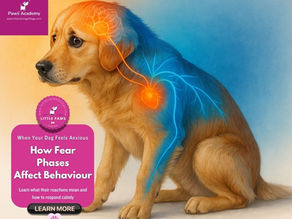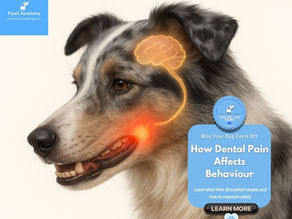top of page
Search


Understanding the Stress Vulnerability Model in Dogs and Behaviour
When a dog reacts in a way that worries us, whether that is snapping, hiding, barking excessively or shutting down, it can feel sudden and confusing. Yet behaviour rarely appears out of nowhere. It builds over time. It reflects both what is happening around the dog and what is happening within them. The article explores what is known as the stress vulnerability model, first described by Zubin and Spring (1977). Although originally applied in human psychiatry, it has powerful

Paws Academy
2 days ago6 min read


Understanding Canine Verbal Communication and Vocalisation
Dogs speak to us every day… not with words, but with sound, tone, rhythm and intent. Barking, whining, growling, howling and those odd little noises they make under their breath all carry meaning. Some are obvious, others more subtle, and many are misunderstood. Learning to recognise canine verbal communication and vocalisation is not about stopping noise, it is about understanding why it happens and responding in a way that supports good behaviour and emotional balance. For

Paws Academy
Jan 266 min read


Dogs vs Wolves, What Really Sets Them Apart?
Dogs and wolves look similar enough that it is easy to assume they behave in much the same way. After all, they share a common ancestor, can interbreed, and some dog breeds look strikingly wolf-like. But living with a dog and surviving as a wolf are very different realities… and those differences show up clearly in both behaviour and physical traits. Many ideas about dog behaviour still come from outdated assumptions about wolves. Concepts like strict dominance hierarchies, a

Paws Academy
Jan 206 min read


Why Adolescent Dogs Forget Recall and How to Rebuild It
One of the most unsettling moments for any dog owner is when recall suddenly stops working. A dog who once turned and ran back happily now seems to ignore you completely, even glancing over before choosing something else instead (often something far more interesting). It can feel abrupt, personal and worrying, especially when recall once felt reliable. This shift most commonly happens during adolescence. It leaves many owners questioning their training, their relationship wit

Paws Academy
Jan 36 min read


The Role of Dopamine in Motivation During Puppy Training
Motivation is one of the most talked about ideas in puppy training. We want puppies who are keen to learn, interested in us and willing to engage. When motivation dips, training feels harder. When it flows, everything feels easier (and more enjoyable for everyone involved). Behind motivation sits a powerful chemical messenger called dopamine. It is often misunderstood, sometimes oversimplified and frequently misused in training advice. Dopamine is not about forcing excitement

Paws Academy
Jan 36 min read


How To Keep Your Dog Calm During Fireworks And Festive Noises
When the festive season rolls in, many of us look forward to cosy nights, family gatherings and the sparkle of fireworks. Dogs, however, often feel very differently. Loud noises can unsettle them, sudden flashes can spook them and busy households can leave them feeling unsure about where to settle. The good news is that there is a lot you can do to help. With a bit of preparation and some thoughtful adjustments, you can make the season easier for your dog and help them stay s

Paws Academy
Dec 21, 20258 min read


How to Create a Safe and Comfortable Christmas for Your Dog
Christmas often brings excitement, noise, visitors and changes around the home. While many people look forward to this time of year, dogs can find it quite confusing. Your home looks different, smells different and sounds different, and your daily routine might shift without warning. For a dog, that can turn what should be a peaceful season into something stressful. The good news is that a little preparation can make a huge difference. With thoughtful planning and small adjus

Paws Academy
Dec 11, 20259 min read


Five Calm Crate Games To Help Injured Dogs Rest And Recover
When a dog is recovering from an injury or medical procedure, crate rest often becomes a key part of their healing plan. Vets recommend it because controlled rest protects the body while it repairs. The crate limits sudden movement, stops overexcitement, and gives your dog a predictable place to settle. Even though crate rest is useful, it can feel quite strange for dogs who are used to moving about or exploring the home. That is where calm crate games come in. They offer qui

Paws Academy
Dec 1, 202510 min read


How Puppies Learn Bite Inhibition: The Physiological Process
When a puppy’s teeth meet your skin, it is easy to think they are being naughty. In reality, biting is part of a complex developmental process that shapes how they interact with the world. Bite inhibition, or learning how to control the pressure of their bite, is not taught through commands but through the body’s sensory and neurological feedback systems. Understanding the physiology behind this process helps you support your puppy’s learning calmly and effectively. What Is B

Paws Academy
Nov 30, 20255 min read


The Role of the Vagus Nerve in Canine Calmness
If you have ever wondered why some dogs seem naturally relaxed while others react to every sound or movement, the answer may lie deep inside their body rather than in their temperament. One of the most powerful influences on a dog’s emotional state is a structure many owners have never heard of, the vagus nerve. Understanding how it works and how to support it can transform your approach to behaviour and wellbeing. What Is the Vagus Nerve The vagus nerve is the main communica

Paws Academy
Nov 29, 20255 min read


The Anatomy of Wagging. What Tail Position Means During Training
Dogs rarely speak with their voices, but they are constantly speaking with their bodies. The tail is one of the clearest parts of that silent conversation. During training, learning to read tail movement helps you understand how your dog feels, whether they are ready for the next step or whether you should pause and help them settle. Many owners notice wagging but do not always realise how much detail sits inside that single movement. The tail can rise, drop, curve, stiffen o

Paws Academy
Nov 28, 20258 min read


How Hip Dysplasia Impacts Training and Behaviour
When your dog starts slowing down on walks, hesitates to jump into the car or suddenly resists training exercises they once enjoyed, it can be easy to assume they are losing motivation or testing boundaries. In reality, these changes often signal something physical, not behavioural. One of the most common culprits, especially in medium to large breeds, is hip dysplasia. This condition can affect how your dog moves, learns and behaves, sometimes long before obvious pain become

Paws Academy
Nov 25, 20255 min read


Why Puppies Chew Everything: Teething Explained Through Anatomy
Your puppy’s chewing may seem relentless. Shoes, table legs, cushions, and sometimes even your hands all become targets. It can feel like mischief or defiance, but chewing is one of the most natural, essential parts of a puppy’s development. Behind those needle-sharp teeth is a complex physical process that causes real discomfort. Understanding what is happening inside your puppy’s mouth helps you manage this stage calmly and protect both your belongings and their wellbeing.

Paws Academy
Nov 23, 20255 min read


Understanding the Adolescent Fear Phase in Dogs and How to Prevent Lifelong Anxiety
Your puppy seemed confident with the world, greeting people happily and exploring new things without hesitation. Then suddenly, they start backing away from strangers, barking at objects they once ignored or flinching at sounds that never used to bother them. It can be confusing, even worrying, when your once-brave puppy begins to act fearful for no obvious reason. What you are seeing is often part of normal development called the adolescent fear phase. This period is tempora

Paws Academy
Nov 21, 20255 min read


Understanding Canine Proprioception: Why Body Awareness Training Matters
Have you ever noticed your dog misjudge a jump, bump into furniture or hesitate when walking on new surfaces? It might not be clumsiness or fear. It could be linked to something few owners think about: proprioception. This term describes your dog’s sense of body awareness, their ability to understand where their body is in space and how it moves. Proprioception shapes everything from coordination to confidence. When it is underdeveloped or disrupted, it can affect behaviour,

Paws Academy
Nov 18, 20255 min read


How a Dog’s Ear Structure Affects Recall Training
Teaching your dog to come when called is one of the most valuable skills you can master together. It keeps them safe, strengthens your communication and allows freedom with confidence. Yet for many owners, recall training feels inconsistent. Some days your dog responds instantly, other days they act as though they cannot hear you. It is easy to assume distraction or disobedience, but your dog’s ear structure might have more to do with it than you think. The Remarkable Design

Paws Academy
Nov 16, 20255 min read


Why Dental Pain Can Cause Aggression or Training Refusal in Dogs
Training sessions are meant to be enjoyable, rewarding and a time for you and your dog to work together. When your dog suddenly snaps, growls or refuses to participate, it can be confusing and worrying. Before assuming stubbornness or behavioural issues, it is worth considering something more physical. Dental pain is one of the most overlooked causes of sudden aggression or reluctance to train. In this post, we will explore why oral discomfort has such a strong effect on beha

Paws Academy
Nov 13, 20256 min read


How Gut Health Influences Behaviour in Puppies and Adult Dogs
When your dog acts out or seems unusually anxious, your first thought might be to check their training, routine, or environment. But what if their gut is playing a part too? In recent years, science has revealed a powerful connection between the gut and the brain, known as the gut-brain axis. This connection does not just apply to humans. It plays a big role in how dogs think, feel, and behave. Understanding the link between gut health and behaviour can help you make more inf

Paws Academy
Nov 10, 20256 min read


The Anatomy of a Bark: What’s Really Happening When Dogs Vocalise
When your dog barks, it can sound like excitement, frustration, or even a full conversation you are not invited to. While barking is one of the most common canine behaviours, it is also one of the least understood. Some dogs bark at the postman, others bark at nothing you can see, and a few bark just to say hello. But every bark has meaning, and understanding the anatomy behind it can help you respond more effectively and strengthen your communication with your dog. This post

Paws Academy
Nov 9, 20256 min read


Why Your Dog’s Nose Is Their Greatest Distraction (and How to Work With It)
If you’ve ever called your dog and been completely ignored because they’re busy sniffing a patch of grass, you’re not alone. Many owners find that their dog’s nose is both their superpower and their greatest training challenge. While it can be frustrating when a simple walk turns into a slow investigation of every tree, understanding what’s happening inside that amazing nose can transform the way you train and connect with your dog. This post explores why your dog’s nose is s

Paws Academy
Nov 7, 20258 min read
bottom of page

